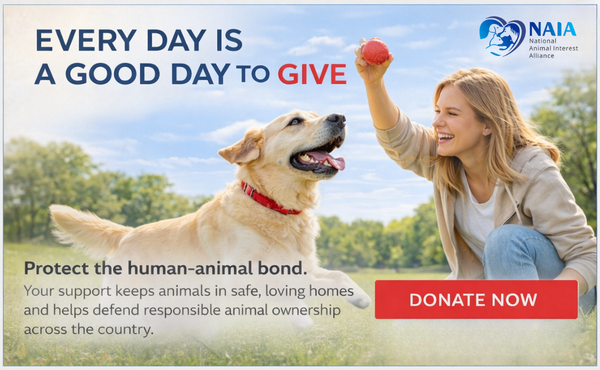Clubs fight for more legislation??
In some parts of our country, purebred dog fanciers are fighting against overly restrictive state and local laws that have been imposed on breeders. Why then, would the 108 dog clubs of the Pennsylvania Federation of Dog Clubs fight for nine years to pass a law requiring that kennels - including our own - and pet shops give health guarantees for puppies sold here? We hope this article will help the dog fancy understand the unique situation that we have here.
Pennsylvania has been called "the most mid-western of the eastern states." People may think of Philadelphia or Pittsburgh as representative of our state, but this is primarily a rural state. Agriculture is our number one industry; large farms cover much of Pennsylvania countryside and we have vast areas of relatively unpopulated land, including a national forest.
Unlike the midwest puppy mill states whose puppies are shipped to far-away markets, Pennsylvania has a large population in its cities and suburbs seeking to purchase family pets. Therefore, we have both open space for dog breeding farms and the close proximity of the puppy-buying public. In addition, much of the state is within easy driving distance for people from Baltimore, Maryland; Wilmington, Delaware; and metropolitan New York and New Jersey.
Pennsylvania has always been recognized for fine purebred dogs that have been produced here. We have many well-known breeders, fanciers, trainers, handlers, and judges. Our all-breed clubs host 50 point shows each year, some of which have close to 4000 entries and dogs from all over the country. We have dozens of specialty and field trial clubs; on almost any weekend you can find some type of purebred dog activity somewhere in the state. The American Kennel Club was founded in Philadelphia in 1884 and held its centennial show here in 1984. Dogs and their owners came from around the globe for a week of events and shows, and we were very proud of our state. Someone seeking a quality, healthy AKC-registered puppy for a pet had a reasonable chance of obtaining one from a conscientious breeder.
You can well imagine our horror when, in the early 1980s, we discovered that a dog broker from a mid-west puppy mill state was coming to a farming community in rural Lancaster County to promote the raising of AKC-registered purebred dogs as a cash crop! This central Pennsylvania area was and is perfect for brokers to set up their businesses because of the reduction in shipping time and costs to metropolitan area pet shops. He came to solicit the Amish and Mennonite farm families into this enterprise. At the time, there were far fewer regulations to govern breeding, raising, and selling dogs than in producing pigs or chickens. With little or no oversight, farmers could raise puppies as cheaply as possible in order to maximize their profits. They could sell puppies directly to the public and also supply the brokers. After all of our years of dedication to our breeds, they were ready and eager to cash in on the public's respect hat we had developed for AKC-registered puppies!
The Lancaster Kennel Club held a meeting attended by more than 400 irate dog club members. A representative from the American Kennel Club told us we would have to strengthen our state laws to address these problems. Since we were aware that the federal government's licensing and inspection programs had been less than adequate in the mid-west, we then worked to update our state dog law. We were able to require that kennels and pet shops be inspected and licensed by the state Department of Agriculture, the department that oversees dog law enforcement. Unfortunately, enforcement of these requirements was not always as good as it should have been because of the desire of the state to protect farmers' incomes rather than the dogs and the people who purchased them. We have continually urged stronger enforcement and have upgraded requirements in this law.
The Amish, who are totally insulated from our English lives and who only go to their own schools through eight grade, began to breed and raise many different breeds of dogs. Their breeding stock was supplied by the brokers. They have no knowledge or concern for the genetic or hereditary defects in these dogs. It is doubtful that they have even heard of, much less read, a breed standard. They have had little or no education on adequate canine veterinary care or nutritional needs. They kept puppies in crowded wire-bottom pens out of sight behind the barn, and gathered puppies up like eggs at sale time.
Obviously, there is no vital early socialization. The kennels were, and in some cases still are, built as inexpensively as possible with a lack of sanitation. Every possible disease, especially parvo virus and distemper, can and does affect the puppies. The bitches are bred every season until they no longer produce many puppies, and then they are disposed of. Is the sire of the puppies really the dog that appears on the AKC papers? Or is it possibly the mixed breed dog wandering around the farm? Since AKC operates on the honor system, who would know? These puppies, of course, are AKC-registered. In the puppy-buying public's mind, they are the same quality as ours!
Pennsylvania now has the dubious distinction of being called the "Puppy Mill Capital of the East." The state has more than 100 large commercial kennels that produce puppies for sale either directly to the consumer or through wholesale channels. Many of the kennels have a dozen or more breeds of dogs and some produce as many as 400 litters of puppies in a year. Pennsylvania ranks seventh in numbers of AKC-registered puppies produced, behind such well-known puppy mill states as Kansas, Missouri, and Nebraska.
The image and value of AKC-registered puppies diminished as more and more people purchased these commercially-produced dogs that had serious health problems. The commercial breeders assumed no responsibility once the puppy left the farm. Many of our pet shops that sold these Pennsylvania-bred puppies would not even return phone calls from distraught buyers.
Since our clubs are very visible and many have public information phone lines, we got long, heartbreaking calls from new owners about their sick, crippled, and dying puppies. People came to our shows and public education events to complain about the problems they had with their puppies. "Don't the dog show people care?" they asked. After all, their dog had papers too!
Shelters and rescue groups also got the calls. The percentage of discarded purebred dogs climbed. One shelter in Berks County proposed a breeding ban that we had to defeat because it only threatened us, not the puppy mills. For 20 years our federation has tried to educate buyers on the correct way to select a purebred puppy, but too many people learned this lesson too late.
Working with shelters and veterinarians, we began to collect and document consumer complaints that verified the high financial and emotional price that owners were paying as they tried to save their puppies. Thus was born the idea for a puppy lemon law. Twelve other states already had lemon laws, including New York and New Jersey. State legislators and the press investigated and exposed the terrible conditions that exist as some of the puppy farms. They heard from dozens of consumers who had purchased these dogs.
State Senator Stewart Greenleaf worked with many people to draft a moderate bill. He had visited a number of these kennels and witnessed the suffering. The law contains provisions that most reputable breeders already abide by. It protects the breeder by requiring a veterinarian to document a puppy's illness and allowing the seller of the puppy to get a second opinion. It also requires that the buyer assume some responsibilities in the process.
It took nine years to pass this law because the puppy mill operators had strong political influence. They were considered members of our highly regarded agricultural community, so we had to convince people that dogs are meant to be companions for many years, not livestock that lasts for a meal. We also had to show that the puppy farmers were profiting while the rest of society was paying a heavy price for sick puppies.
Led by Robert Yarnell Jr., the non-Amish operator of Kimbertal Kennels in Chester County, the commercial kennel owners hired a former Lancaster County legislator as a lobbyist to fight us at the Capitol. Yarnell's Kimbertal Kennels sells close to 300 litters of Dobermans, Rottweilers, and rare breed puppies per year. The complaints against his kennel were featured in an article in the Philadelphia Inquirer. Yarnell started a campaign of misinformation and lies to try to destroy us and our federation - making us stronger and more determined to get the law passed.
We, on the other hand, had the most wonderfully varied coalition imaginable. We had the support of the AKC, the state's humane societies, veterinarians, the Pet Industry Joint Advisory Council, animal rights groups, national animal welfare organizations, and dozens of dedicated individuals working with us. It is our hope that by continuing this alliance we can successfully resolve other issues as they arise in Pennsylvania. We can truthfully say, "Dog show people really do care!"
 |
Like this article? Don’t forget to share, like or follow us |
 |
NAIA WEEKLY ROUNDUP
FEATURED & LATEST ARTICLES
GET THE NAIA WEEKLY ROUNDUP VIA EMAIL FOR FREE
Stay Connected with The NAIA: Sign Up for The Weekly Roundup
Join our FREE newsletter and community of animal advocates and receive The NAIA Weekly Roundup straight to your inbox. Stay in the loop with the latest news, events, and ways you can make a difference in the lives of animals. Sign up now to stay informed to create positive change!
Sign Up




 Farm Bill, Free Spay & Neuter Vouchers, Another Dog Steals the Show, and More!
Farm Bill, Free Spay & Neuter Vouchers, Another Dog Steals the Show, and More!
 Dogs, Veterinarians, Elephants, and More!
Dogs, Veterinarians, Elephants, and More!
 Copper Overdose at the Zoo, Owner of Killer Dogs Found Guilty, and More!
Copper Overdose at the Zoo, Owner of Killer Dogs Found Guilty, and More!
 The Great Veterinarian Shortage: Farm Edition, Elephant Rampage, and More!
The Great Veterinarian Shortage: Farm Edition, Elephant Rampage, and More!



